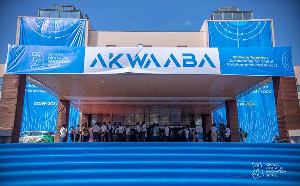 The fourth National Digital and Innovation Week is being held from October 2 to October 4, 2024
The fourth National Digital and Innovation Week is being held from October 2 to October 4, 2024
The 2024 Ghana Digital and Innovation Week, under the theme "Innovate Together: Collaborating for Digital Transformation and Impact," has kicked off at the Accra International Conference Centre.
The national event, being held from Wednesday, October 2 to Friday, October 4, 2024, will witness a gathering of partners within Ghana’s digital ecosystem to inspire action, foster commitments, celebrate successes, and encourage collaboration.
Speaking at the opening ceremony on Wednesday, various speakers, including the Chief Executive Officer of Telecel Ghana, Patricia Obo Nai, underscored the need for collaboration as a propellant for innovation.
“If you look at the youthful population that we have here and the fact that Ghana is one market that is high in the consumption of data, we have so much presence of our youth on social media. We already have the knowledge, we have the ability, and some of them have the tools to be able to use it productively to derive wealth.
“I was saying that there is about $5 trillion of contribution to GDP around the world and actually 60% of that is coming from productivity alone. So it's not even just generating revenues by the telcos, it's also people who are using the technologies to generate wealth. And so Ghana has a huge opportunity. Although we talk about gaps in internet access, I think it's an opportunity to use what we have and the skills that our youth already have to be able to drive growth and development,” she told the press.
She underscored collaboration as the pathway to the future of the digital space and thus urged industry players to be open to working together.
Speaking on behalf of the Minister for Environment, Science, Technology and Innovation, the Chief Director of the Ministry, Dr. Patrick Nomo, expressed excitement about the potential of the Ghana Digital and Innovation Week.
“The event, which started like a mustard seed, continues to grow significantly every year. This demonstrates that ecosystems take time to grow, and what we are seeing today therefore holds great promise for Ghana’s emerging digital and innovation ecosystem,” he stated.
He highlighted Ghana’s position as an attractive destination for digital startups and innovation and attributed this development to the commitment of the various actors in the nation’s digital ecosystem, hinged on deliberate government policies.
The United Nations Resident Coordinator, Charles Abani, on his part, challenged actors within the digital space to see existing challenges within the space as opportunities for growth and expansion.
He also acknowledged Ghana’s growth in the digital space in the areas of improved digital infrastructure, expanding inclusion and digital connectivity, as well as policies such as the implementation of the Ghana card as laying firm foundations for sustained development.
“It is refreshing that Ghana’s digital ecosystem has witnessed significant growth with about 24 million active internet users representing about 74% of the population,” he stated.
Representatives of the German and British governments also highlighted their commitment to supporting Ghana’s growing digital space to the benefit of the country’s citizens, including the youth.
The event, being organized by a consortium led by the National Entrepreneurship and Innovation Program (NEIP), Ghana Hubs Network (GHN), and Impact Investing Ghana (IIGh), includes partners such as GIZ, the German Government, MASHAV, the Ministry of Environment, Science, Technology, and Innovation (MESTI), and the Ministry of Communication and Digitalization (MoCD). It will feature exhibitions, panel discussions, and sessions on the latest trends in digital innovation, offering participants a chance to learn, network, and explore new opportunities.
Over 6,000 individuals and organizations, including very promising startups, are participating in this year’s edition.
Ahead of the national event, the organizers held six regional programs dubbed ‘The Road to GDIW’ to facilitate dialogue, exchange of best practices, and ensure collaborative action among diverse stakeholders, including government agencies, civil society organizations, academia, private sector entities, Traditional Authorities, and community representatives.